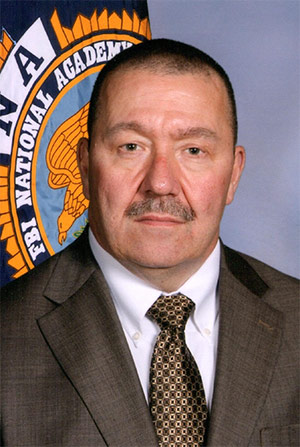Contact Us
To provide feedback on the Community Policing Dispatch, e-mail the editorial board at CPDispatch@usdoj.gov.
To obtain details on COPS Office programs, publications, and resources, contact the COPS Office Response Center at 800-421-6770 or AskCopsRC@usdoj.gov

U.S. Department of Justice
Office of Community Oriented Policing Services
Washington, DC 20530

Kevin D. Monroe
Undersheriff, Allegany County Sheriff's Office
Officer wellness is often perceived as how fast an officer can run a mile or how much he/she can bench press. One might think about cardiovascular health, b ut how often is mental health considered as a component of officer wellness?
The law enforcement profession often puts mental health related issues on the back burner. As command staff and leaders of our agencies, we can no longer ignore this very serious problem affecting our officers. Our mental health is affected every time that we put on the uniform. Each day, we are at a greater risk of developing Post-Traumatic Stress Disorder (PTSD).
The clinical definition of PTSD is “a condition of persistent mental and emotional stress occurring as a result of injury or severe psychological shock, typically involving disturbance of sleep and constant vivid recall of the experience, with dulled responses to others and to the outside world.”1
Emergency Services, including firefighters, as well as law enforcement officers, are constantly exposed to traumatic incidents. Examples of these incidents include an infant dying of SIDS or a fatal car accident that takes the life of two teenage girls. I had to answer a suicide call involving a high school classmate who was a good friend of mine. He shot himself in the head right before his mother picked him up to go to rehab. In addition to responding to traumatic incidents such as these, we have to respond to unattended deaths of the elderly, bar fights, hangings, and constant complaints from the public telling us how to do our job. When we go to work, the job is not the only stress. As officers, we often work rotating shifts, which can cause sleep deprivation. Sleep deprivation is not good for anyone’s mental health. Officers are prone to anxiety without knowing the cause. Sometimes, it takes a family member or good friend to bring it to our attention. I would suggest that fellow law enforcement officers ask for help, given the difficult work schedule and emotionally draining situations that we face daily. Law enforcement officers, let a mental health professional do an evaluation for your safety and the safety of your family. Waiting several years to seek help and experiencing constant stress will most likely lead to officers becoming victims of PTSD. One critical incident can have a major effect on an officer’s mental health and possibly destroy relationships. Don’t be embarrassed or ashamed to ask for help.
Researchers at the University of Buffalo conducted a ten-year study on the pressures of law enforcement. They found that officers are at a higher risk of high blood pressure, insomnia, heart problems, PTSD, and suicide.2 There is now clinical proof that the pressures of law enforcement can have lasting physical and psychological effects on the body. In a study, “A Badge of Life” from 2015, there were an estimated 102 police suicides.3 How many of those 102 suicides were PTSD related?
As officers, we all have to go to the range to be proficient with our side arms. We go to the doctor for our yearly physical. Maybe it is time that we “take the time” to have a yearly checkup of our mental health. Start the conversation because you never know who needs to listen.
Kevin D. Monroe
Undersheriff
Allegany County Sheriff's Office
Belmont, New York
*Kevin D. Monroe is an Undersheriff at Allegany County Sheriff's Office in Belmont, New York and completed the FBI National Academy Session #271 on February 23, 2018.
References:
1. “Post Traumatic Stress Disorder,” Oxford Dictionary, accessed June 5, 2018, https://en.oxforddictionaries.com/definition/us/post-traumatic_stress_disorder
2. “Researchers Investigate Impact of Stress on Police Officers' Physical and Mental Health,” The University at Buffalo, September, 25, 2008, http://www.buffalo.edu/news/releases/2008/09/9660.html
3. “2015 Police Suicide Statistics,” Officer.com, January 13, 2016, https://www.officer.com/training-careers/article/12156622/2015-police-suicide-statistics
Subscribe to Email Updates
To sign up for monthly updates or to access your subscriber preferences, please enter your email address in the Subscribe box.






